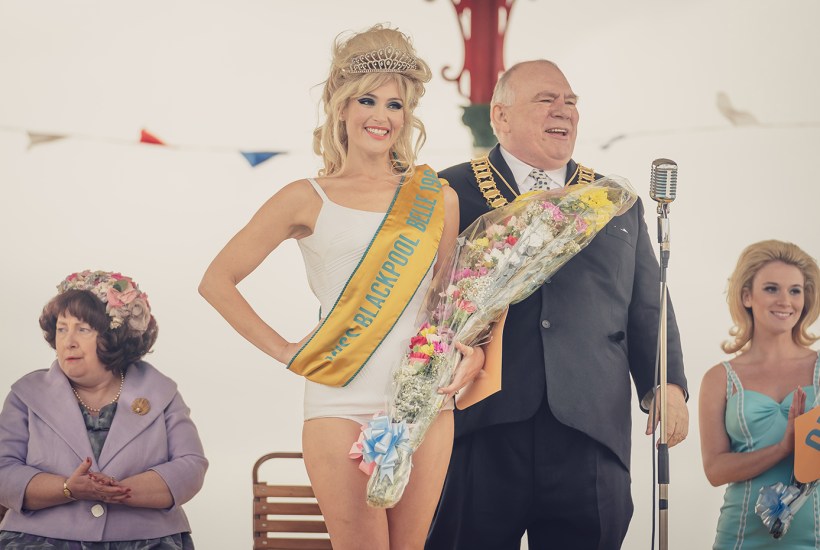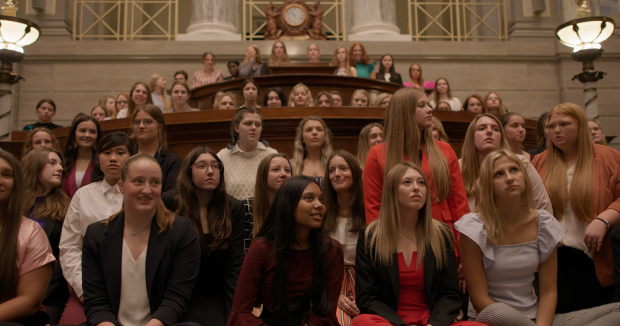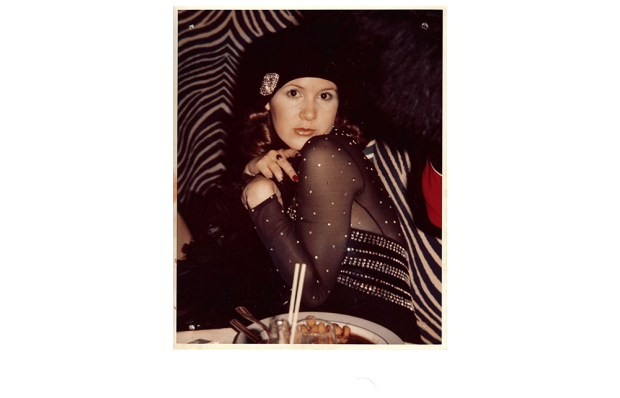Nick Hornby’s 2014 novel Funny Girl was both a heartfelt defence and a convincing example of what popular entertainment can achieve. Telling the story of Barbara Parker, a fictional 1960s TV star, it took a stern line on highbrows who prize the punishing over the pleasurable, while delivering a lot of pleasure itself. My only reservation was that Hornby was a little too obviously smitten with his heroine: a ‘quick-witted, unpretentious, high-spirited, funny, curvy, clever, beautiful blonde’, whose attitudes occasionally seemed to owe a suspicious amount to contemporary feminism.
The trouble with Sky’s television version – renamed Funny Woman – is that the ‘occasionally’ of that last sentence has become ‘pretty much always’, with Barbara now a kind of Blackadder figure: someone from our own day stuck in a benighted past. The result on Thursday was a first episode that, while quite jolly, felt too much on the nose to be anything more than disappointingly superficial.
After a swift blizzard of images confirming that it was indeed the 1960s, Barbara (Gemma Arterton) was seen being crowned Miss Blackpool 1964 despite her fears that ‘Janice Alstrop has a bigger beehive’. After a spot of leering by a sexist mayor, she was asked by a sexist journalist to push her chest out for a photograph. At which point, she had the sudden realisation that young women parading in swimsuits were at risk of objectification, quit the role and in the traditional 1960s way took a train to London (cue the lights of Piccadilly Circus).
As she waited ‘to be someone’, Barbara got a job in a department store and duly moved into a bedsit. The programme had some fun with the store’s strict hierarchy – the saleswomen of female couture at the top (‘one went on a date with a Beatle’) and the perfume counter the best place to bag a gentleman friend who might know the world of showbusiness. Sadly, the one who invited Barbara up West (cue ‘Downtown’ by Petula Clark) turned out to be married, which earned him a stern talking-to on the unacceptability of such behaviour. But not before Barbara had caught the eye of a theatrical agent, played by Rupert Everett with a fat suit and astonishing hamminess.
Except of course that what he had in mind for her career didn’t match her own ambitions. Rejecting his advice to invest in a gingham bikini, she explained that she wouldn’t demean herself like that. Instead, she wanted to follow her heroine Lucille Ball into comedy. Now all she has to do is triumph over the prejudice against her accent and the idea that beautiful women can’t be humorous.
For the viewer, however, there’s another possible obstacle to her dreams. From what we’ve seen till now, Barbara’s comedy stylings consist essentially of gurning and putting on silly voices. In other words, a further problem for Funny Woman on Thursday was that the woman wasn’t very funny.
And still with on-the-nose drama, Tuesday brought us Consent, where the author’s message – urgent if not wildly surprising – comprehensively overrode such considerations as making much narrative sense.
Lashay Anderson played (rather well) a girl called Natalie: a black sixth-former on a scholarship at a posh private school, otherwise populated mostly by grossly misogynist boys. Caught in the middle was Archie (Tom Victor), who liked and admired Natalie but felt obliged to go along with the grossness as he planned on having sex with her at his 18th birthday party. Come the big night, the two flirted affectionately, then drunkenly, until they disappeared into his bedroom…
The following day, Archie seemed to think nothing was amiss. ‘I don’t want you to think it’s just about… what happened at the party,’ he assured Natalie. ‘I really do like you.’ He was therefore both horrified and incredulous when she told a teacher she’d been raped. So had she changed her mind afterwards? Or was Archie the victim of a terrible injustice?
The answers, needless to say, were ‘no’ and ‘no’. Somewhat sneakily, Consent didn’t do a bad a job of going through the motions of keeping us guessing. Yet in a face-off between a penniless black girl and white male toff, there was never going to be – and politically couldn’t be – any doubt about who was lying. Meanwhile, the school leapt into dastardly posho action by instigating a cover-up, sending Natalie back where she belonged and making sure Archie got into Oxbridge.
Eventually, the final scene revealed not only that Archie had raped Natalie when she was unconscious, but that he’d recorded it on his phone for his toxic mates. All of which meant that, contrary to everything we’d seen, he’d somehow been a total psychopath from the first. Either that or the drama had suddenly remembered that he needed to be one if it was to avoid a battering on Twitter.
Got something to add? Join the discussion and comment below.
Get 10 issues for just $10
Subscribe to The Spectator Australia today for the next 10 magazine issues, plus full online access, for just $10.
You might disagree with half of it, but you’ll enjoy reading all of it. Try your first month for free, then just $2 a week for the remainder of your first year.














Comments
Don't miss out
Join the conversation with other Spectator Australia readers. Subscribe to leave a comment.
SUBSCRIBEAlready a subscriber? Log in